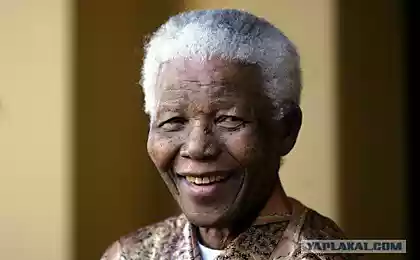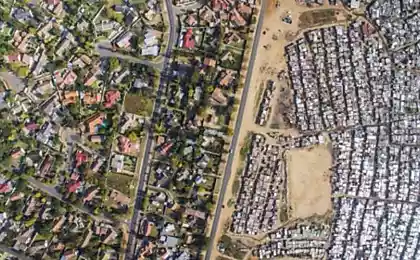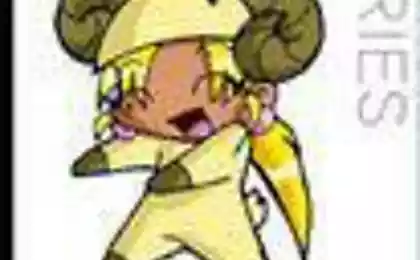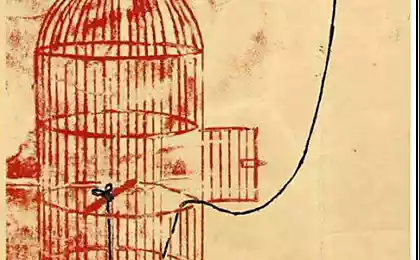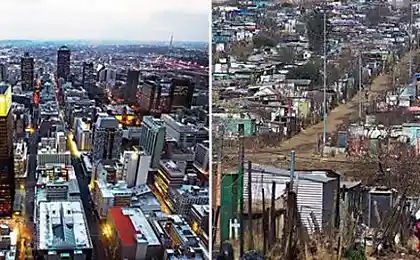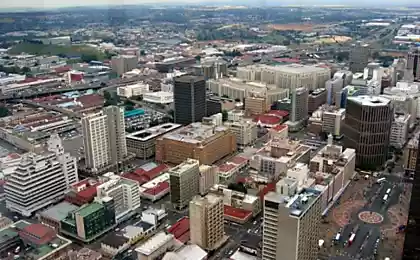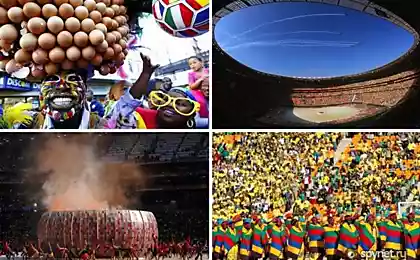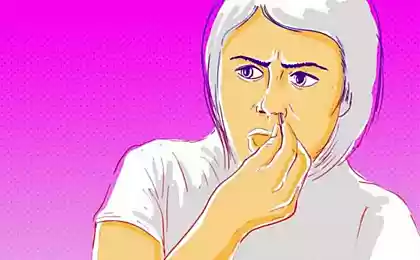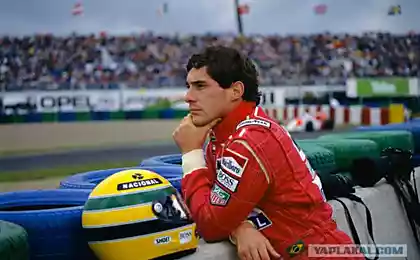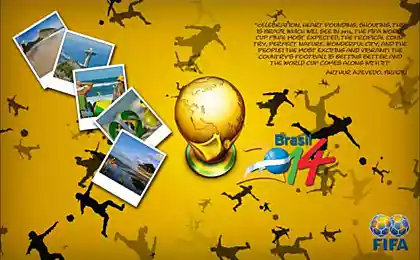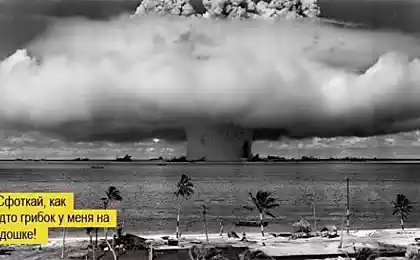570
The effects of urbanization in South Africa - the championship on the nose
How should the city to grow and develop? And really there anyway to set for their growth any standards? These and other questions are now on the agenda at the World Urban Forum, held in Rio de Janeiro (Brazil). Hopes and challenges associated with the growth of the city, becoming much more noticeable if this growth is accelerated by some event - for example, the World Cup soccer tournament.
8 ph via bigpicture
1) 9 cities in South Africa will host the championship in June and July of this year. Municipal authorities promised that the maximum use of this opportunity to improve living conditions in selected cities. For example, here in Cape Town built this stadium. Unlike several playing fields of private clubs, which were supposed to do in this place before, new stadium - «Green Point Common», will be open to all, free of charge, seven days a week; Anyway, so say the authorities.

2) However, preparing for the World Cup and create a problem. Commissioner for Human Rights recently reported that about 20 thousand residents of squatter settlements in Cape Town lost their shacks that were demolished to make way for the construction of new housing. Slum dwellers were moved to settlements like the one shown in the picture, called Blikkisdorp (Blikkiesdorp). 29-year-old Zitta Meyer says that she moved to force social workers, in case of failure threatened to send her to prison. "They just took and put us here as the chickens, leaving no other choice", - says Zitta. Cape Town authorities insist that everything was done legally and fairly. Krondzh Peter, Speaker of the municipality, said: "We do not close our eyes to the social problems of our city. We are currently engaged in the restructuring of the plurality of unauthorized settlements in the city, with the aim of turning them from the "ghetto" in ordinary neighborhoods fit them into a citywide structure. The city has a program of social housing, but in turn it cost about 300,000 people.
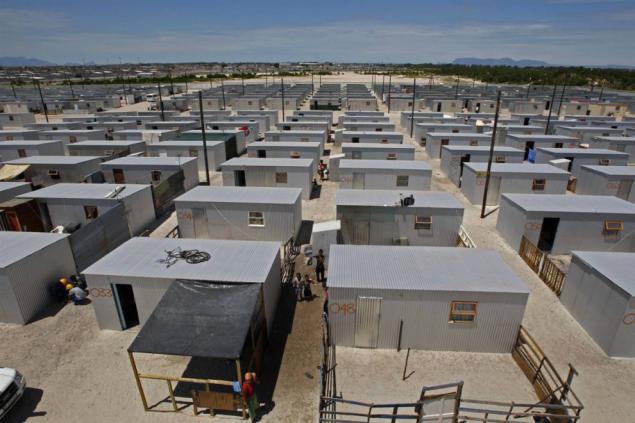
3) Many related to the forthcoming World Cup in Cape Town projects are "green" character. For example, the enhanced supervision of the cleanliness and ecological status of this and other beaches in the Gulf of False Bay. Also, in many houses of economy-class set of solar water heating for domestic use.
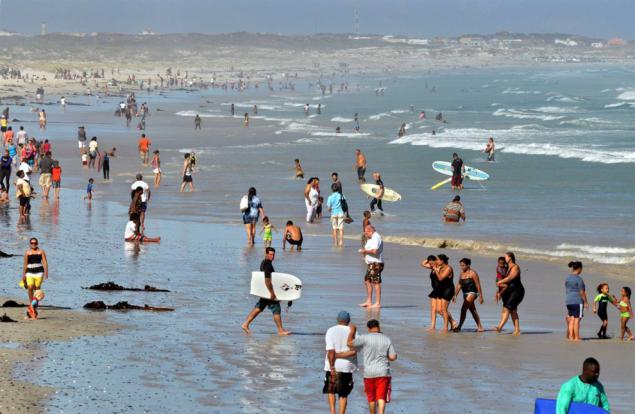
4) on the eve of the Championship Evictions affected not only Cape Town. In Johannesburg, the authorities also went to this measure, especially with regard to refugees from abroad. These and other natives of Zimbabwe, about 2 thousand people have received temporary accommodation in the Methodist Church in central Johannesburg. Reykvel Rolnik, an investigator for Human Rights, concluded in his report that "the efforts of the South African government on the eve of the World Cup to create a more complete and prosperous society is not always withstand a collision with reality."
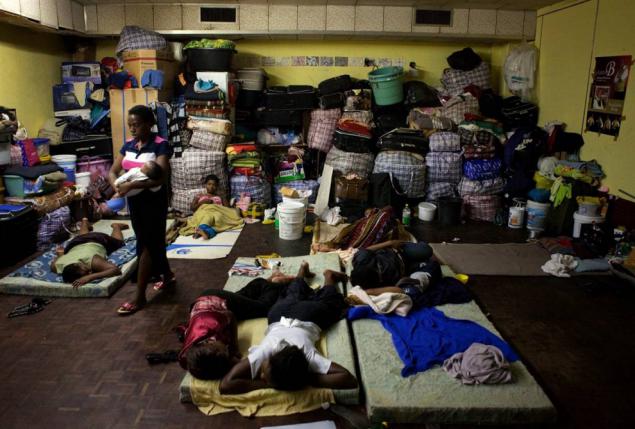
5) This road junction in Cape Town ended just before the championship. Its construction has helped not only to improve road communication, but also provide a large number of people work in a country where more than a quarter of the working population are unemployed.
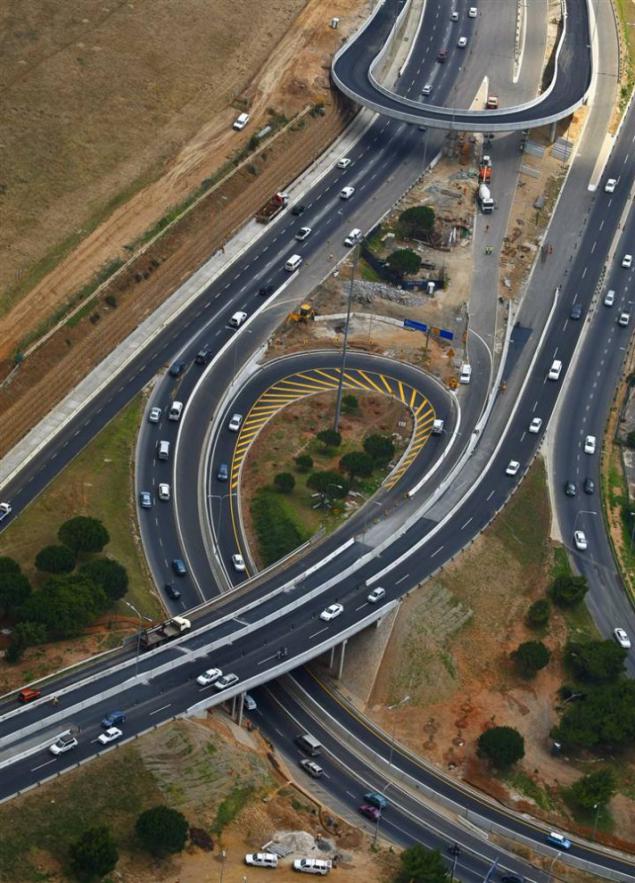
6) Street vendors, like this woman in Durban (Durban) - More one city take the championship - expect to earn in this period. But not all will succeed. Authorities warned hawkers that sales drivers of stuff, while they are at the traffic lights will be banned. The UN has criticized not only local authorities but also the football federation FIFA, organizing the World Cup. The UN Commission on urban studies (HABITAT) has concluded that the Federation "derelict" in ensuring the appropriate infrastructure.
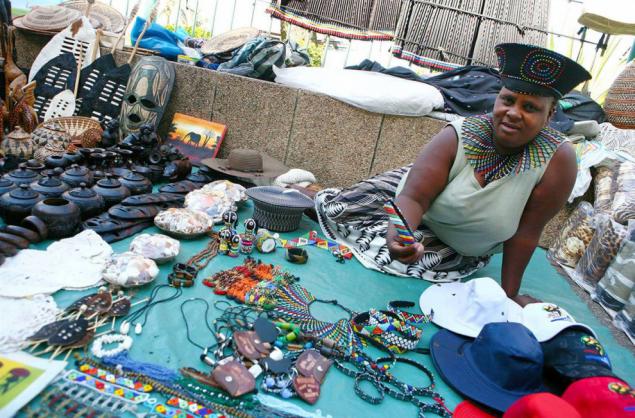
7) social tension on the eve of the Championship includes dissatisfaction with taxi drivers and drivers of private minibuses, who fear that The developed during extensive transportation network Cup will leave them without work. In this image, the police fired on protesters taxi drivers in the city of Soweto near Johannesburg. Take into account the overlapping interests of different parties - a challenge for officials, and in Johannesburg it is particularly difficult to make. After all, this city, along with two other South African cities, Buffalo City and the East Rand, have been named the "most socially unequal in the world."
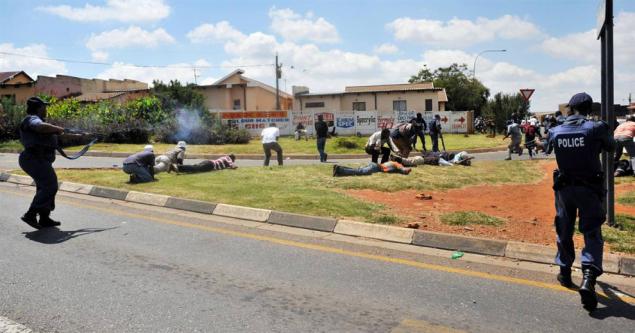
8) Passengers precipitated buses, standing on the outskirts of Cape Town, as taxis do not go. Drivers of private minibuses for two days attacked and smashed the new centralized system of buses Bus Rapid Transport System (BRT), which, in their view, threatens to leave them without a livelihood. BRT transport network is part of the city's preparation for the championship. According to the UN report, over the past 10 years the number of people living in slums has increased by 51 million people.
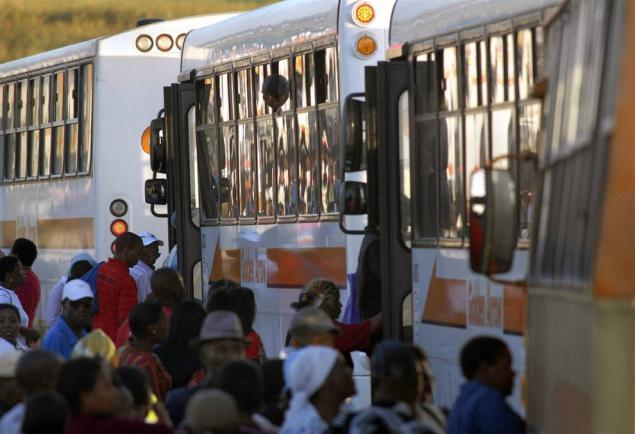
Source:
8 ph via bigpicture
1) 9 cities in South Africa will host the championship in June and July of this year. Municipal authorities promised that the maximum use of this opportunity to improve living conditions in selected cities. For example, here in Cape Town built this stadium. Unlike several playing fields of private clubs, which were supposed to do in this place before, new stadium - «Green Point Common», will be open to all, free of charge, seven days a week; Anyway, so say the authorities.

2) However, preparing for the World Cup and create a problem. Commissioner for Human Rights recently reported that about 20 thousand residents of squatter settlements in Cape Town lost their shacks that were demolished to make way for the construction of new housing. Slum dwellers were moved to settlements like the one shown in the picture, called Blikkisdorp (Blikkiesdorp). 29-year-old Zitta Meyer says that she moved to force social workers, in case of failure threatened to send her to prison. "They just took and put us here as the chickens, leaving no other choice", - says Zitta. Cape Town authorities insist that everything was done legally and fairly. Krondzh Peter, Speaker of the municipality, said: "We do not close our eyes to the social problems of our city. We are currently engaged in the restructuring of the plurality of unauthorized settlements in the city, with the aim of turning them from the "ghetto" in ordinary neighborhoods fit them into a citywide structure. The city has a program of social housing, but in turn it cost about 300,000 people.

3) Many related to the forthcoming World Cup in Cape Town projects are "green" character. For example, the enhanced supervision of the cleanliness and ecological status of this and other beaches in the Gulf of False Bay. Also, in many houses of economy-class set of solar water heating for domestic use.

4) on the eve of the Championship Evictions affected not only Cape Town. In Johannesburg, the authorities also went to this measure, especially with regard to refugees from abroad. These and other natives of Zimbabwe, about 2 thousand people have received temporary accommodation in the Methodist Church in central Johannesburg. Reykvel Rolnik, an investigator for Human Rights, concluded in his report that "the efforts of the South African government on the eve of the World Cup to create a more complete and prosperous society is not always withstand a collision with reality."

5) This road junction in Cape Town ended just before the championship. Its construction has helped not only to improve road communication, but also provide a large number of people work in a country where more than a quarter of the working population are unemployed.

6) Street vendors, like this woman in Durban (Durban) - More one city take the championship - expect to earn in this period. But not all will succeed. Authorities warned hawkers that sales drivers of stuff, while they are at the traffic lights will be banned. The UN has criticized not only local authorities but also the football federation FIFA, organizing the World Cup. The UN Commission on urban studies (HABITAT) has concluded that the Federation "derelict" in ensuring the appropriate infrastructure.

7) social tension on the eve of the Championship includes dissatisfaction with taxi drivers and drivers of private minibuses, who fear that The developed during extensive transportation network Cup will leave them without work. In this image, the police fired on protesters taxi drivers in the city of Soweto near Johannesburg. Take into account the overlapping interests of different parties - a challenge for officials, and in Johannesburg it is particularly difficult to make. After all, this city, along with two other South African cities, Buffalo City and the East Rand, have been named the "most socially unequal in the world."

8) Passengers precipitated buses, standing on the outskirts of Cape Town, as taxis do not go. Drivers of private minibuses for two days attacked and smashed the new centralized system of buses Bus Rapid Transport System (BRT), which, in their view, threatens to leave them without a livelihood. BRT transport network is part of the city's preparation for the championship. According to the UN report, over the past 10 years the number of people living in slums has increased by 51 million people.

Source:
